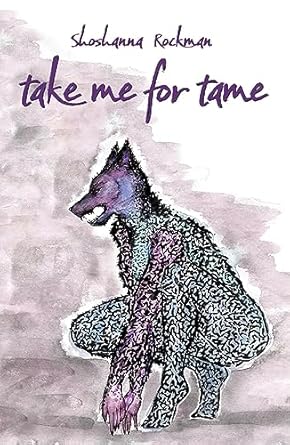 Reviewed by Magdalena Ball
Reviewed by Magdalena Ball
take me for tame
by Shoshanna Rockman
Ginninderra Press
ISBN: 9781761096143, paperback, Oct 2023
Shoshonna Rockman’s debut poetry collection, take me for tame, is anything but tame. These are fierce poems, rooted in an exuberant defiance that works through oppression to find triumph. At thirty-six poems, the collection is thin, but the poems are condensed and carry a lot of weight. take me for tame reads like memoir, a somewhat linear coming-of-age story that builds meaning through a connective thread that connects the speaker in each of the poems and moves progressively through time. The book opens with a series of generationally-linked poems under the banner of “Between” that move from the pogroms to the Holocaust, great-grandparent to grandparent, and then to parent with divorce and custody battles – collectively forming a chain of trauma that moves through the generations in wordplay that uses sound and structure to connect the initial traumas with their later incarnations:
I marry—deep into the fold. We build a house. Move on.
Move in. Build a double-story, which crumbles
into debris. Into divorce. Afterwards, I move between houses
so the children can stay put.
Yiddish and Polish are mentioned in the first “Between” poem as original languages that slip and are lost, like a culture or mother-tongue, these initial traumas giving way to more dissolution through a painful divorce that drags the children into court depicted with typographics that simulate the sense of dislocation from a child’s perspective:
I (took) refu s/(ge)/ed (in) the game plan –
the one remaining,
the one devised well in advance,
the one I’d sworn to follow.Silence. My only (move)
weapon. (“Children (‘s) (court)caught”)
Subsequent poems work through the speaker’s own divorce and its aftermath: “a rivet in the same machine”. Motherhood is conveyed through an interiority that is visceral and embodied. In a way that harks back to the original trauma, daily life is charged with a misogyny that seems to be lurking in every corner, whether that’s a date gone wrong or even a visiting locksmith:
down the jamb and it all swings
wide and vulgar. He is sure to
remind you—
a locksmith never needs a key –
any formal invitation or consent
Written or otherwise. (“The Locksmith”)
This is an ominous thread through many of these poems, a sense that danger is lurking, but there is also bravado that becomes a reclamation, a resilience and a secret power that is drawn from poetry itself, even in the midst of greatest vulnerability. This is particularly evident in the poem “Totemism” from which the title phrase is taken:
I know my scent.
I pose no danger – less than my plastic double.
unless hunted on my mountain top
or followed to my lair, you might take me
for tame. (“Totemism”)
Though the poems are often set in moments of personal trauma, sexual abuse, and the aftermath of loss, there is a wry humour scattered throughout the book. One example is the retelling of the Wizard of Oz as an elegy to the death of Elphaba, the much-maligned Wicked Witch of the West:
And only now she’s gone, do they begin
to ask those quantum questions
about whether this accident was accidental,
or the consequence of some malign force —
more potent than witchcraft. (“Blame”)
Other funny poems including a confession about submitting poetry while drunk, reversing a rotting banana back to a pristine Cavendish, or walking down the aisle of Coles as Medusa, whose dramatic head of snakes ensures a “clear path”:
Imagine my clear path.
As I shop aisles at Coles,
As I walk past construction
sites to silence. (“I so admire Medusa”)
Although the penultimate poem puts out a wish for more assertiveness, the final poem in the book is a cry of triumph, woman as dragon: “Purple plumes shoot from my mouth/to rival the stratosphere. (“Dragons don’t smoke”). take me for tame is a powerful debut, strong and vulnerable, humorous and intense in its exploration of emotional trauma and the ways it manifests through generations. Rockman is a poet to watch.